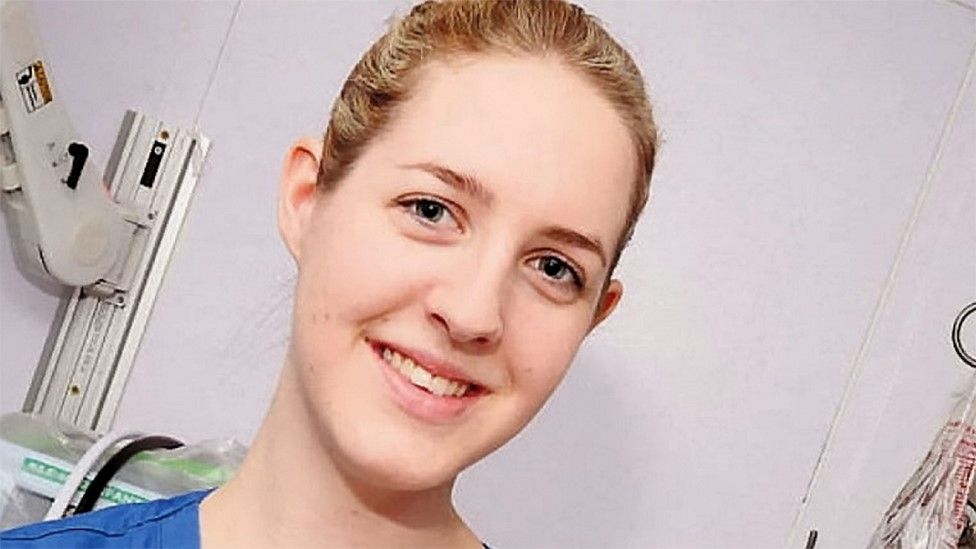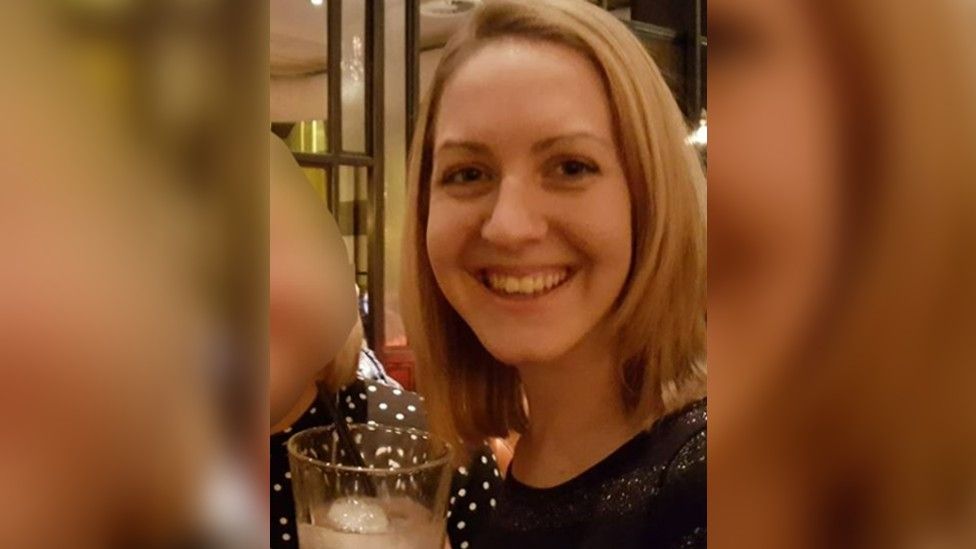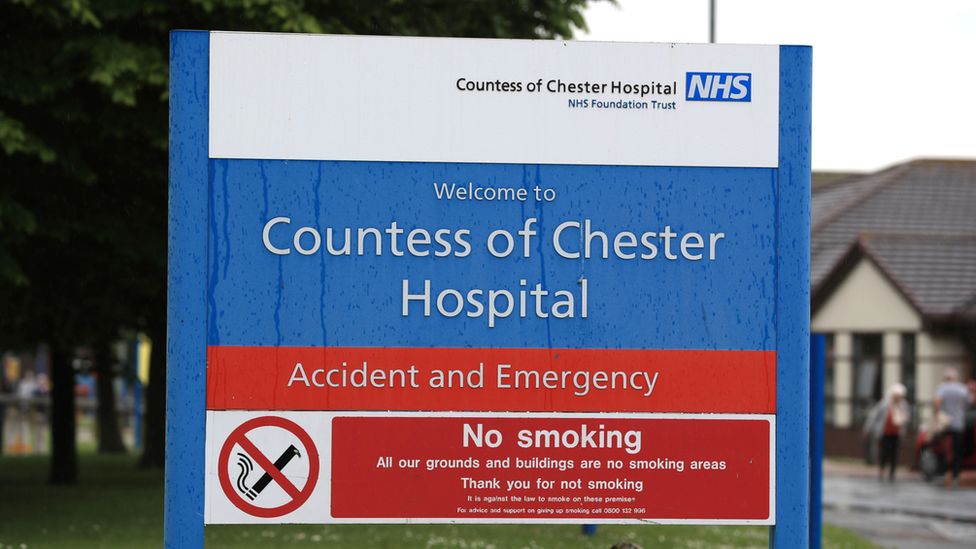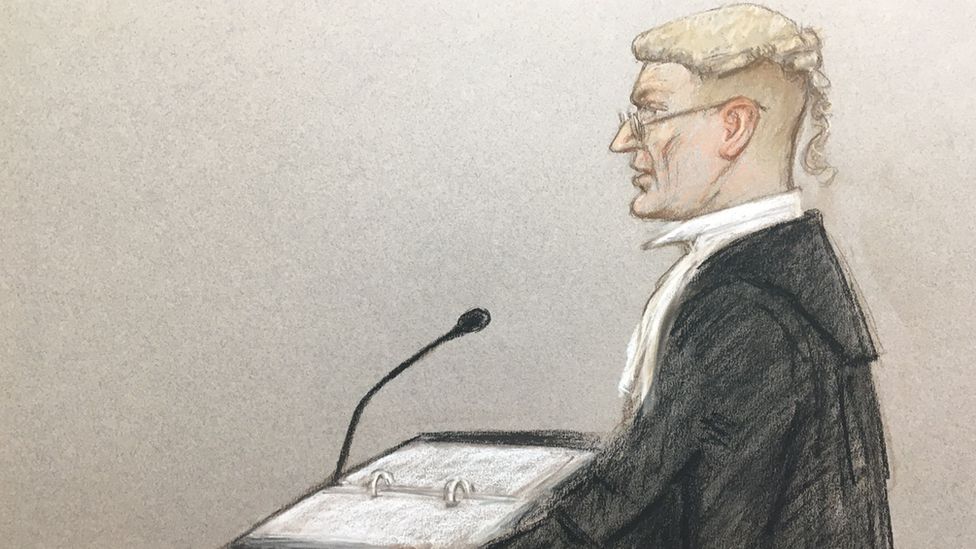
A nurse accused of murdering babies on a neonatal ward killed a premature baby girl on the fourth attempt before sending her parents a sympathy card, a court has heard.
Lucy Letby is charged with murdering seven babies and attempting to murder 10 others at Countess of Chester Hospital in 2015 and 2016.
Manchester Crown Court was told Ms Letby allegedly tried to kill the girl by injecting her with air.
Ms Letby, 32, denies 22 charges.
Continuing the prosecution's opening statement for a third day, Nick Johnson KC said the circumstances of the girl's death were "an extreme example even by the standards of this case".
"There were four separate occasions on which we allege Lucy Letby tried to kill her," he said.
The child, referred to for legal reasons as Child I, was "resilient," he said, "but ultimately at the fourth attempt, Lucy Letby succeeded in killing her".
He said on the first occasion Ms Letby, of Hereford, had injected Child I with air.
On her second attempt, he said she had stood in the doorway of the girl's darkened room and commented she looked pale.
The girl's designated nurse then turned on the light and saw Child I was not breathing.
Following a third alleged attempt to kill her, Child I was again found to have excess air in her stomach, which had affected her breathing.
She was transferred to Arrowe Park Hospital where she stabilised, before being taken back to Chester, the court heard.

When Child I's medical alarm went off following a fourth attempt, another nurse found Ms Letby next to the incubator, the jury was told.
The baby died that morning.
Mr Johnson said: "[Child I] was born very early and very small.
"But she survived the first two months of her life and was doing well by the time Lucy Letby got her hands on her.
"It was persistent, it was calculated and it was cold-blooded."
The court heard how in the immediate aftermath of Child I's death her parents were taken to a private room and asked if the baby's mother wanted to bathe her daughter.
As the mother bathed her child, Ms Letby came into the room and, in the words of the mother, she "was smiling and kept going on about how she was present at the baby's first bath and how much the baby had loved it".
The jury was told Ms Letby later sent a sympathy card to the child's parents and kept an image of the card on her phone.
During a police interview she agreed this was unusual but said it was not often nurses got to know a family as well as they had got to know Child I's, the court heard.

The court was also told how a suspicious doctor walked in on Ms Letby as she allegedly attempted to kill another baby.
Dr Ravi Jayaram, a paediatric consultant, had helped deliver Child K, who was born at 25 weeks, and later became aware Ms Letby was alone with the baby.
Mr Johnson told the jury: "Feeling uncomfortable with this because he had started to notice the coincidence between the unexplained deaths, serious collapses and the presence of Lucy Letby, Dr Jayaram decided to check on where [Ms Letby] was and how Child K was.
"As he walked in he saw Ms Letby standing over Child K's incubator.
"Dr Jayaram could see from the monitor on the wall that Child K's oxygen saturation level was falling dangerously low, to somewhere in the 80s."
He said an alarm should have been sounding as Child K's oxygen levels were falling.
"We allege she was trying to kill Child K when Dr Jayaram walked in," Mr Johnson said.
Dr Jayaram found Child K's chest was not moving and asked Ms Letby if anything had happened, to which she replied: "She's just started deteriorating now."
Mr Johnson said Dr Jayaram found Child K's breathing tube had been dislodged.
The prosecutor said it was possible for this to happen in an active baby, but Child K was very premature and had been sedated.
'Remarkable recovery'
The jury heard the alarm should have sounded but could be overridden for one minute.
Despite his concerns at the time, Dr Jayaram did not make a note of his suspicions, the court heard.
Later the same morning Ms Letby was again at Child K's cot calling for help.
She was assisting the baby with her breathing and it was found Child K's breathing tube had this time slipped too far into her throat, the court heard.
Child K was transferred to another hospital later that day but remained unwell and died two days later. Ms Letby is not accused of her murder.

Earlier, Mr Johnson told the court about attempts made on the life of another premature girl, Child H, on two consecutive night shifts.
He said that girl had a series of known medical problems but had suffered two inexplicable collapses.
He said on the first night, Ms Letby was the girl's designated nurse and, after she collapsed, she was transferred to Arrowe Park Hospital and underwent a "dramatic improvement".
He said Ms Letby had not been Child H's designated nurse the following night, after she was returned to Chester.
Mr Johnson said: "It is a notable fact in the case of [Child H] and others that as soon as children were removed from the Countess of Chester and the sphere of influence of Lucy Letby, it was often followed by their sudden and remarkable recovery."
He said a week after the baby's collapses, Ms Letby searched Facebook for the girl's parents and for the families of two other children she is accused of attacking.
The court also heard about Child J, who Ms Letby is accused of trying to murder.
She was a premature baby girl who was "doing well and healthy" after a bowel operation.
But she suffered two serious problems with her breathing overnight in November 2015 when Ms Letby was one of the six nurses working, the jury was told.
She was moved to a high-dependency room and had a seizure at 06:56 GMT. At 07:20 Ms Letby gave the baby a glucose infusion.
Minutes later Child J collapsed again with a seizure and had to be resuscitated, with the help of a doctor, but he could not explain why it had happened again, the jury heard.
An independent medical expert who reviewed Child J's case said it was "of concern and consistent with some form of obstruction of her airways, such as smothering".
Again, Ms Letby, made searches on Facebook for the child's parents.

The jury was told of twin baby brothers, Child L and M, who the nurse is charged with attempting to murder in April 2016.
By this time, Ms Letby was supposed only to be working day shifts because consultants were concerned about the correlation between her presence and unexpected deaths and life-threatening episodes on the night-shifts.
Mr Johnson said the defendant had volunteered to work an extra shift after she noted Child L's low glucose levels shortly after his birth the previous day.
"We say that in effect she saw the opportunity to complete what she had attempted [with Child F]," he said.
The prosecution said Ms Letby attacked Child L first by adding insulin to his nutrient feed and then, while that attack was under way, administering air into Child M's circulation.
Child M suffered an unexpected life-threatening event "without warning" and came close to death and his twin's blood sugar was left dangerously due to the insulin poisoning, the court heard.
When Ms Letby's home in Chester was searched two years later, medical notes were found detailing how many doses of adrenaline were given to Child M during his collapse and a note of his collapse was in her diary.
"She denied the notes were a souvenir and she denied deliberately trying to harm [Child M]," Mr Johnson said.
The nurse allegedly tried to kill another premature baby, referred to as Child N, who had a blood disorder, on three occasions.
Mr Johnson said this meant Ms Letby believed, wrongly, his disorder gave her "cover" to attack him because if he bled it would be put down to the condition.
He suffered a sudden life-threatening lowering of his blood oxygen levels but recovered after emergency assistance, the court heard.
Independent medical experts said the baby's sudden deterioration was consistent with some kind of "inflicted injury" or him having received an injection of air.
Twelve days later, in June 2016, Ms Letby is alleged to have made two more attempts to murder Child N.

The court also heard about Child O and Child P, two boys from a set of triplets. Ms Letby is charged with murdering them both on successive days.
Within a few minutes of the nurse coming into the neonatal unit, Child O suffered his first collapse described as a "remarkable deterioration", the jury was told.
A breathing tube was inserted by medical staff and the baby was resuscitated but he suffered another episode later and this time doctors were not able to resuscitate him.
A post-mortem examination found unclotted blood in Child O's body from a liver injury and a coroner certified death on the basis of natural causes and intra-abdominal bleeding.
Mr Johnson said: "It would not occur to [the coroner] a nurse would have assaulted a child in the neonatal unit."
He said an independent pathologist had since reviewed the case and was of the opinion the liver injury was not the result of chest compressions in resuscitation.
Mr Johnson said the most likely cause was an impact-type trauma, adding: "In brutal terms, an assault."
The expert also concluded Child O had fatefully received excessive amounts of air into the bloodstream and through a nasogastric tube.
A year later, on the anniversary of Child O's death, Ms Letby carried out a Facebook search for his family's surname, the court was told.
The trial continues.

Why not follow BBC North West on Facebook, Twitter and Instagram? You can also send story ideas to northwest.newsonline@bbc.co.uk
Related Internet Links
https://news.google.com/__i/rss/rd/articles/CBMiN2h0dHBzOi8vd3d3LmJiYy5jb20vbmV3cy91ay1lbmdsYW5kLW1lcnNleXNpZGUtNjMyMjgxNDfSATtodHRwczovL3d3dy5iYmMuY29tL25ld3MvdWstZW5nbGFuZC1tZXJzZXlzaWRlLTYzMjI4MTQ3LmFtcA?oc=5
2022-10-12 15:59:52Z
1602588338
Tidak ada komentar:
Posting Komentar